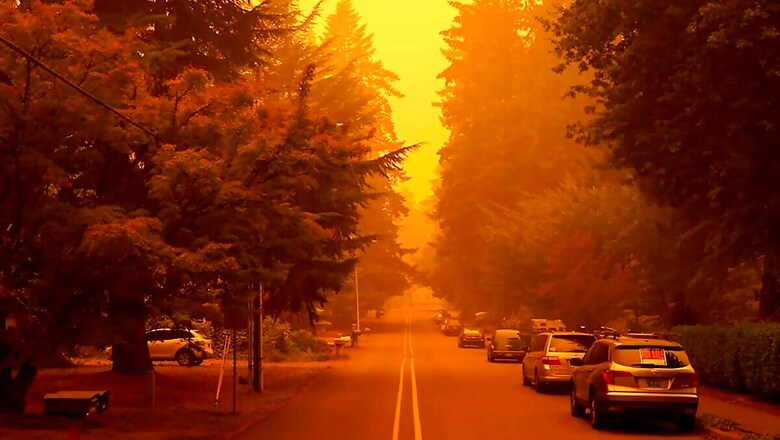
views
James Hancock scans the hills he has known since childhood and rules out flames coming towards his home, on a Native American reservation nestled in a mountainous area of California ravaged by out-of-control wildfires.
Hancock has decided to defy an evacuation order issued for the town of Tollhouse, close to where the blaze known as the Creek Fire is burning. It has already devoured more than 175,000 acres (71,000 hectares) since it was ignited a week ago, and just six percent of it is contained.
Hancock is one of the few who stayed. Life seems to have stopped suddenly on his block: Toys and balls are abandoned in the yards of neighboring houses. A couple of black dogs wander aimlessly, sneezing from the dense smoke that has settled over the street.
“I don’t feel it’s going to come this way,” the 52-year-old, who has lived on the Cold Springs Rancheria of Mono Indians, a Native American reservation, since he was a child, told AFP, adding he is “not leaving.”
His wife Eleonore Davis, 62, evacuated at first with their children and grandchildren.
But she returned alone soon after, before authorities blocked the road to the hills of the Sierra National Forest near Fresno in central California.
Their only problem is the smoke, and that they have no electricity — cut off to avoid sparks that could fan the flames — and, consequently, no water, which runs on an electric pump.
“We grew up with no electricity back in the day, so we know what’s going on,” the black-haired Davis says with a laugh.
“Our ancestors didn’t have any of that and they did fine,” agrees Hancock.
Just 44 families remain on the reservation. Some are making preparations to leave – just in case.
Ronald Bugskin, 50, finished loading his motorcycle, power saw and some other essential items into a trailer so he would be ready if he had to evacuate.
“I hope I don’t have to leave,” he said.
Houses are marked with a yellow paper that reads “evacuated” next to a black X.
Hancock’s, however, is marked with a sheet of red paper instead — indicating that he refuses to leave. He could even face minor court charges for defying the evacuation order, though that is unlikely.
“The police have come, they ask me if I know the evacuation procedures. They come often because there has been some looting,” another reason to stay, he says.
A white pick-up from the tribal council passes by the house to hand out a bottle of drinking water.
Another neighbor arrives to relay the news that firefighters have cut the brush on the mountain — and that it is almost impossible for the fire to be directed at the community, as Hancock predicted.
Daniel Ramey, spokesman for the fire team assigned to the Creek, said he is aware that evacuating “is frustrating and not fun” for locals.
But “we always recommend people to leave if they are in those warning areas,” he insisted, adding that until a fire is 100 percent contained it can still change direction.
Hancock has lived on the reservation since he was five years old, and he remembers another fire, when he was 11.
Davis also remembers that blaze – though, she says, the Creek Fire is “the first time I’ve seen one like this.”
She described seeing the glow from the fire on the mountains as “scary.”
Both have a backpack ready in case they have to leave – which they say will only be in the worst case scenario. For now, they sit on the porch of the house where they have lived for 30 years, watching the ashes fall like snow.
















Comments
0 comment